
 |
||||||||||||||
 |
||||||||||||||
Another phenomenal job from Jim Thornton. Love that he quotes Larkin. * * * Comic who didn't die Norman Wisdom made his first low-budget comedy in 1953. The critics hated it, but audiences loved the little underdog who left a trail of mayhem behind him and eventually got the girl. He cranked out fifteen more and made a fortune. At his peak, his films made more money than the James Bond franchise did in the Sean Connery era. Then, quite suddenly, it wasn't funny any more. In the swinging sixties maybe slapstick went out of fashion, or perhaps a 50-year-old playing a teenager for laughs had become more grotesque than funny! Whatever the reason, the run stopped dead. But Wisdom was still alive with nearly half his life in front of him. What should he do? He started badly. He went to Hollywood but made only one film there, his wife left him, and a disastrous effort in 1969 to revive the aging funny man in a sex romp was so embarrassingly dire that he never made another big screen movie. But he was lucky in another way. His films were just as funny with the sound turned down. Wisdom's remarkable physical clowning, his too-tight jackets, pratfalls and facial expressions were the only good bits in them. The plots were so weak and the jokes so laboured that non-English speakers enjoyed them more than the original audiences. The films carried on selling all over the world, with fans and regular revival festivals as far away as Hong Kong and Australia. He made a good living on cruise ships and the chat show circuit. Most incongruously, Wisdom (or at least his character "Pitkin") became a star in Albania. Enver Hoxha, the mad dictator of that benighted country, had woken up one morning and decreed that Wisdom's comedies were the only western films that could be shown. Allegedly one was shown on Albanian TV every day for thirty years. There were even Wisdom TV channels. Whether he was really popular, or just slightly more interesting than a turned-off set, I've no idea, but back in England he became better known for being "famous in Albania" than for the films themselves. No one watched them any more. He travelled with the England football team to Albania and, to hysterical cheers, came on the pitch at half time. In England he came on at half time if an Albanian club visited, if an Albanian player turned up, or if the hot dog man was Albanian! Every article or TV documentary about Albania mentioned his fame there. Eventually he worked his way back into some sort of English favour; at least he got minor parts in TV sitcoms and turned up on English chat shows again. When he developed senile dementia and his family moved him into a nursing home and sold off his Rolls Royce, he was famous enough for the BBC to make a programme about that. He lived so long that, in 2008, Sky News prematurely released his obituary. Famous in Albania, programmes about your dementia, and a premature obituary. As the poet Philip Larkin once said in another context: "That's what you get for not dying, see!" — Jim Thornton
|
||||||||||||||
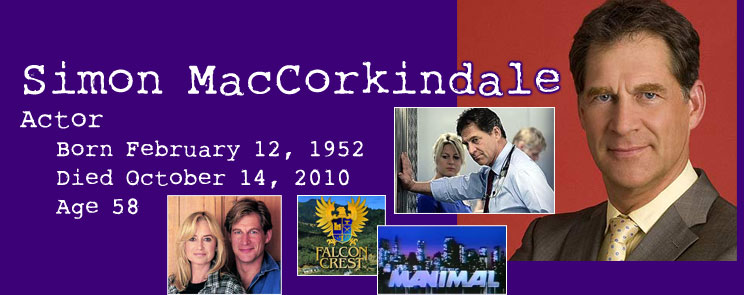 |
||||||||||||||
Simon MacCorkindale was the star of a short-lived American TV show called Manimal, in which he played an NYU professor who could turn into animals, and in that role he would help the NYPD fight crime. That was back in 1983 and, mercifully, the show didn't last long. A year or so later MacCorkindale returned, this time as a closer approximation of a human being on a prime-time soap opera called Falcon Crest, which starred Ronald Reagan's first wife as an evil bitch. MacCorkindale did that series for a couple of years, made some money, quit, and went back home to England. MacCorkindale aged into other and better roles. His boyish good looks were replaced by character lines, and they served him well. Toward the end of a career that was filled with a great deal of work, most of it on television, MacCorkindale played a doctor on a (very!) long-running BBC series called Casualty, which I have never seen, even though it's been on the air for almost twenty-five years. One unkind critic has said of Casualty, "The prosthetic injuries out-act the cast," but this does not seem to have mattered to the show's ongoing success. MacCorkindale worked on the show for six years, ending in 2008. MacCorkindale was married twice. His first wife was an actress named Fiona Fullerton, who's probably best remembered in Britain for having played the lead in a 1972 version of Alice's Adventures in Wonderland. Fiona bore a remarkable resemblance to Kirsten Dunst. The marriage lasted six years, ending in 1982. MacCorkindale married actress Susan George in 1984. He'd actually first met Susan in 1977, a year after he'd married Fiona. Susan may be best remembered as the incest-committing, Ken Norton-loving Southern belle in the 1975 film Mandingo — which, come to think of it, is probably best not remembered at all. Susan was well cast as MacCorkindale's wife, though. The marriage lasted until his death. MacCorkindale was diagnosed with bowel cancer in 2006. It was found in his lungs the following year, and he was told that if he had five years left, he was lucky. In late 2009 he told the world he was dying. During the next eleven months, MacCorkindale worked almost without pause as an actor and a director, and he continued raising horses with Susan at their farm on the southwest coast of England. When he died Susan told the press, "To me, he was simply the best of everything, and I loved him with all my heart. He will live on in me forever." At the end, a rave review, and the only one that really mattered. Allen Kirshner, Born with the Defect, CIB, Dead People Server, EdV, Erik, Mark, Mo, Monarc, Morris the Cat, Philip and Ray Arthur get 14 points each for the hit. — Brad |
||||||||||||||
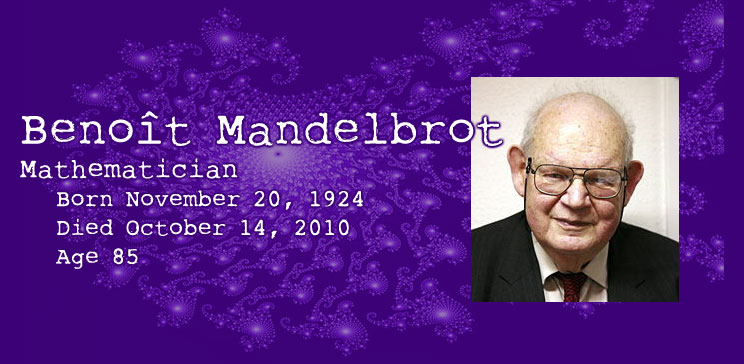 |
||||||||||||||
One of the things I've always loved about AO is the knowledge base of its denizens. In the case of Matt Hubbard, an old-timey AO denizen, the knowledge base is mathematics. So I knew he was the go-to guy for the fractal guy. I know it's good, because I barely understand it. That's math for you! Thanks, Matt. * * * Benoît Mandelbrot coined the word "fractal." Even non-mathematicians might remember fractals. They were a popular culture fad about thirty years ago, fading from view around the same time as sociobiology and Gödel Escher Bach. Fractals may not be bandied about in coffee shops anymore, but the idea is still bearing fruit in computer science, math and biology. What is a fractal? Is it a noun or an adjective, like in the title of Mandelbrot's most famous book, The Fractal Geometry of Nature? Mandelbrot was vague at first. Without a definitive statement, some wag declared "fractals are the mathematical proof for the existence of paisley." By the time of his death, the definition had been refined to self-similarity, systems with small pieces that look like the whole. Think of tree branches or blood vessels. A nautilus shell, if shrunken and rotated just the right amount, will be almost identical to the last chamber the critter inhabited. Benoît Mandelbrot is considered a French or Franco-American mathematician, but he was born in Warsaw in 1924 into a family of Lithuanian Jews, the family name Yiddish for "almond bread." They left Warsaw in 1936 for Paris. When the war came, they moved again, leaving their son in the care of a rabbi. He spent much of the war in hiding. After the war, he attended college, studying math and aeronautics in France and the U.S., and getting a Ph.D. at the University of Paris. Instead of the teaching route, Mandelbrot took work at IBM's Thomas J. Watson Research Center in Yorktown Heights, New York. The standard mathematical path to glory is solving some open problem that has stumped the finest minds for decades or centuries. Mandelbrot found fame pondering a poorly defined concept of his own making for a very long time, usually a one-way ticket to Eccentric Palookaville: Could math replicate the messy shapes and patterns created by living things that grew following instructions stored in self-replicating cells? Jonathan Miller said in The Body In Question that everything must be understood first in metaphor. The heart was a drum until someone invented the pump, and no one could have dreamed the better metaphor before the pump's invention. The computer was both Mandelbrot's metaphor and major tool. Mandelbrot didn't so much "prove" his main thesis as show it was plausible. Computer graphics took huge strides forward in creating natural looking landscapes and biological textures based on simple instructions repeated at different scales many times. On self-similarity, the last word goes to Sally Draper, precocious daughter of Don Draper of Mad Men, from an episode this season, discussing eternity with her creepy friend Glen.
— Matt Hubbard
|
||||||||||||||
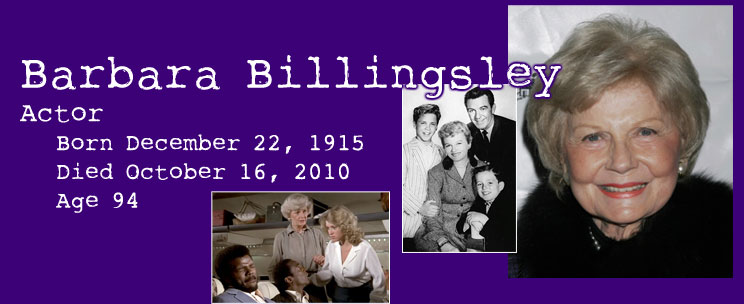 |
||||||||||||||
Charlene gets the hit, volunteers for the update, and makes me happy. * * * You could be forgiven for thinking that June Cleaver died last week. According to numerous obituaries, June was the sweetest, kindest, most wholesome wife and mother in American history, never raising her voice or losing control while running a household in high heels and pearls. She was there for her husband, she was there for her sons, she was there for her community — but nobody was there for her, since even within the constricts of a television situation comedy she was nothing but a fantasy of the perfect, and perfectly impossible, faithful married woman who exists only to give, give, give. Barbara Billingsley, the woman who played June and the one who actually died last week, was from all reports a marvelous woman in her own right, but she was not the two-dimensional G-rated male wish-fulfillment fantasy she played on TV. Those who hold up June as the perfect stay-at-home mother forget that Barbara was herself a working mother (and a single mother at that) who had to support her two small children. She may have welcomed the work, but it left her so badly typecast that she hardly ever worked again. She never publicly expressed any resentment, but I suspect that she sometimes thought her golden egg had hatched into a goose. Here at the AO Deadpool we indulge in a different form of typecasting: everyone plays a corpse. Barbara Billingsley died at the age of 94. Leave it to Charlene, Kathi, Kixco, Tim J and Worm Farmer, who had her on their lists, earning them each 2 points. — Charlene |
||||||||||||||
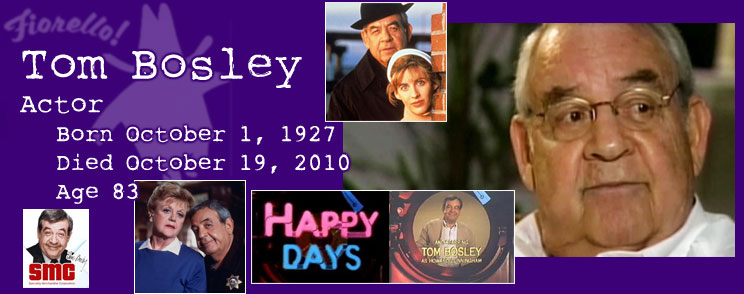 |
||||||||||||||
Can't think of anything to say about Tom Bosley that hasn't been said, so I'll post Steve Miller's Wall Street Journal obit, which I'm pretty sure didn't find itself to alt.obits. He's a far better obit writer than I am. Check out his observation about how long the show ran. Jenstrikesagain gets this amazing solo. She gets the ten points, deservedly so. * * * Tom Bosley was the portly actor on TV's Happy Days who played Howard Cunningham, the laid-back father on a show set in the halcyon 1950s. He was 83 and had battled lung cancer. By the time he landed the role of Mr. C, as the show's Arthur Fonzarelli called him, Mr. Bosley was a veteran of TV and stage who had won a Tony award as the star of Fiorello! But Happy Days made him a national star. The show ran for 11 seasons, longer even than the decade it eulogized. Mr. Bosley was often thereafter cast as fathers of various kinds, including a Catholic priest who solves brutal crimes in The Father Dowling Mysteries. Growing up in Chicago, Mr. Bosley came to acting almost by accident. His mother was a concert pianist and his father a real estate broker who lost everything in the Depression. His parents divorced, and he joined the Navy at age 17. A rabid Cubs fan, Mr. Bosley later enrolled in the Radio Institute of Chicago, intent on becoming a play-by-play broadcaster. Acting classes were part of the curriculum, and he ended up doing live radio dramas, including Terry and the Pirates. He traveled to New York in 1950. After several years of struggling with small roles, supporting himself by checking coats at Lindy's, Mr. Bosley beat out 200 actors to land the lead role in the 1959 musical Fiorello! He won a Tony for best actor in a musical. The Wall Street Journal described an actor more like someone schooled in the Method than Richie Cunningham's dad. Starring as New York's Mayor LaGuardia, Mr. Bosley was "darkly volatile and galvanic and, when he needs to be, quiet and convincing." He did almost 800 straight performances, and his career was launched. After Fiorello! closed in 1962, he married Jean Christine Eliot, a dancer in the show and a former Rockette. During the 1960s, Mr. Bosley stayed in demand on Broadway, starring in Catch Me If You Can in 1965. But it was on TV that he found his true métier, with regular roles on The Debbie Reynolds Show and The Sandy Duncan Show, as well as featured roles in other series and TV movies. He moved to Hollywood in 1967. In 1974, Mr. Bosley was cast as Howard Cunningham, the role that would occupy him through 1984. He went back to series work and maintained an active career until recently. In addition to TV and stage work, Mr. Bosley did voice roles for animation including Wait Till Your Father Gets Home and several Pinocchio movies. He returned to Broadway in 1994 in the original cast of Beauty and the Beast, in which he played Belle's father, Maurice. Mr. Bosley had season tickets at Dodger Stadium, where manager Tommy Lasorda was known to razz him for staying loyal to the Cubs. "Thank God I'm also a Chicago Bears fan," he told the Toronto Star in 1986, when the Bears won the Super Bowl. — Steve Miller |
||||||||||||||
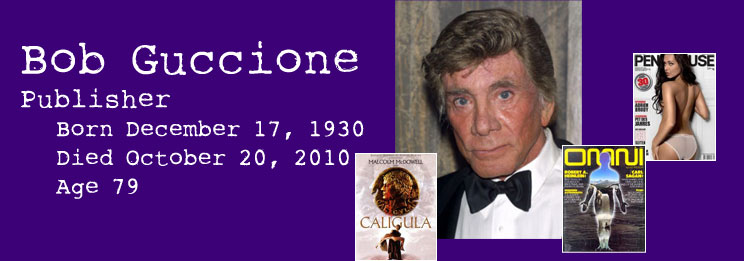 |
||||||||||||||
Don't blame me. This was a Bill Schenley special. * * * Bob Guccione should have been held accountable — he introduced Bush to America. Okay, enough bush jokes. Wait a minute ... One more. Yeah, yeah, I know, I know, anything to dehumanize women ... Alright, where were we ... Oh, yeah, the Bob Guccione update. Among others, the guy founded the magazines Penthouse, Omni, Viva, Spin and Longevity. In Penthouse, he showcased Madonna, who by the way, is really freakin' hairy ... Probably not important, huh? By the way, do you know, that if not for Bob Guccione, there are a few AO posters who might never have seen female genitalia? Here's the first Penthouse Pet. All tasteless jokes aside, Guccione was a pimp. Hef was a pimp, too, although his women were $100-a-night hookers as opposed to Guccione's, um, crack hos. Guccione introduced to American youth a mass of tangled pubic hair and what, at the time, was referred to as "pink," but in today's more politically correct world is more often thought of as a steaming, wide-open, dripping, syphilitic, yeast-infected gash (thank god for that all new Internet civility, eh). And, yes, those of you who bought his rag (I know, I know, you only bought it for the letters) ... anyway, those of you who bought his wanker mag, you were Guccione's johns — the tricks. And I don't want to hear a word out of any of you Jeebus-lovin' anti-abortion neo-fucking-cons, not after all of god's little angels you thoughtless bastards drowned in your momma's toilet bowl. In the end, Mr. Guccione, at 79, made Hulka as hard as Chinese arithmetic and Amelia as wet as October, all because Bob was as dead as your proverbial fucking doornail. They each get eight points for this stiff ... and another three bonus points puts all but dead Bob back in the pink. Total: 11. — Bill Schenley |
||||||||||||||
